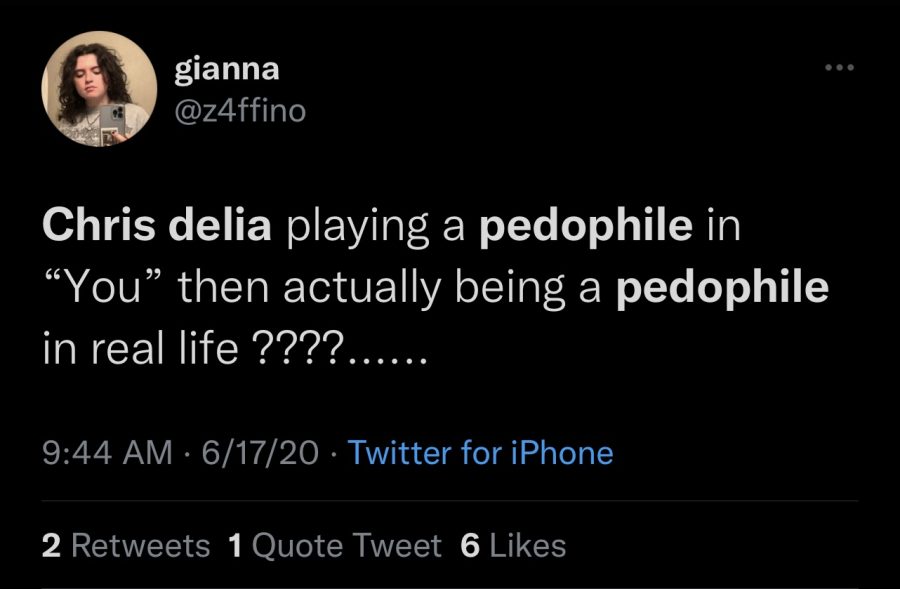Age gap relationships can be predatory
41 year old comedian Chris D’Elia played the role of Henderson on the Netflix series “You.” Henderson was a pedophile who acted on his urges. D’Elia’s has had five sexual misconduct accusations from at least five underage girls, all of which he has denied.
The sexualization of youth is endemic in western culture. Youth is sexualized so heavily and consistently that it has changed society’s collective view of it. We place an emphasis on the attractiveness of being underage or looking underage so much that it can be seen anywhere– from basic ad campaigns to the big screen. This disturbing value has warped girls’ self perception and their idea of what a relationship should be and look like. This teaches them that they are an object that is to be perceived as attractive; this leads them to think the validation of older men is desirable and necessary to be validated as a human being.
Nothing about the sexualization of underage girls is normal. It enables predatory behavior and it sets girls up for a difficult and confusing life.
This issue relates to age gap relationships. An age gap is defined as the “difference in age between people, especially as a potential source of misunderstanding.”
These types of relationships can become a gray area very quickly. It can be hard to determine if it is love or lust driving the relationship but regardless, those that are legal can still be immoral. For example, a 50 year old man can date a 20 year old woman legally but considering where she is in her life, he can be taking advantage of her and her naivete. In this case it is legal but immoral.
Girls in middle and high school may be under the impression that having an older boyfriend, perhaps someone in their late teens or early twenties makes them cool, but to adults who understand the gravity of the situation, it is highly concerning.
It is never a matter of “being mature for your age.” In fact, it has nothing to do with that. These relationships are built on the fact that the older man knows he can manipulate you so he can get what he wants. In this context the younger girl never has the upper-hand; it is always the older person who holds the power.
Predatory relationships require grooming.
Grooming is defined as, “the action by a pedophile of preparing a child for a meeting, especially via an internet chat room, with the intention of committing a sexual offense.”
An article on the website Cracked “On Grooming and Power Imbalances,” brings up the fact that the term “grooming” does not have the correct feeling attached to it.
The article says, “Imagine a 14-year-old girl, slowly getting her hair brushed by a 40-year-old stranger in a faded Motorhead T-shirt whispering: ‘You’re so mature for your age.’ That pit of disgust you just felt in your stomach is the nature of grooming, an insidious, predatory manipulation of the most defenseless demographic in the world, insecure children.”
Grooming is a methodical action that adults use to prey on young people. There are seven grooming steps according to “Grooming Dynamic.”
These steps include: targeting the victim, gaining trust, becoming an important role in the child’s life, isolation, creating secrecy around the relationship, introducing sex into the relationship, and controlling the relationship.
Maintaining control in the relationship can turn violent very quickly. The threats can range from “I’ll/we’ll go to jail,” to threats of violence against the child or their family. In extreme cases, the perpetrator will blackmail them and even threaten to post the child’s photos.
Deana Gullo, a trauma therapist with a license in social work said, “The most problematic part of an age gap relationship is the damage done to a child who is forced, or coerced into sex with an adult. This can cause life long trauma predisposing an individual to depression, substance abuse, development of psychosis, and suicide.”
Gullo said that the way a minor is taken advantage of depends on their age. When the victim is younger they can be easily manipulated. Gullo said, “They may be tricked into providing personal information without knowing. They may be exposed to sexually inappropriate information or images without realizing it. They may eventually learn to doubt their own sense of danger when someone may develop a trusting relationship with them by getting them to disregard their initial concerns for safety or appropriateness. They may be induced into doing drugs or drinking alcohol.”
Trauma therapist Octavia Fukino said, “The biggest problem is the power inequality. The young woman or girl has little resources mentally and materially that could help her. Her dependence on the man makes her vulnerable to exploitation.”
When asked about who holds the power in an age gap relationship, Fukino said, “The adults. Always.”
These relationships are immoral due to the power imbalance an age gap creates, especially an illegal one. In a functional relationship both partners have equal power, wherein this type, one person holds all the power.
Fukino said, “The adults have resources and power. They pretend to care. The minors are lured by these attentive adults and trust too easily. The minors give information and privacy in exchange for affection.”
Grooming can happen anywhere and the perpetrator can be anyone.
A study from 2010 found that 1 in 11 children in the United States aged 10 to 17 reported receiving an unwanted sexual solicitation online.
The Child Exploitation and Online Protection Centre (CEOP) investigated 1,145 cases of online grooming in the UK in 2012. The Canadian cyber tipline, Cybertip.ca received about 1,000 reports of online “luring” cases from September 2007 to June 2011.
The National Center for Missing and Exploited Children (NCMEC) reported that in the United States from 1998 to 2013, the CyberTipline had received reports of more than 60,000 cases of online enticement of children for sexual acts.
The National Society for Prevention of Cruelty to Children (NSPCC) showed in 2015 more than 3,000 offenses in the UK were perpetrated against children following the use of technology. From these numbers, about one child is sexually abused online every three hours.
Gullo said there are some red flags parents can be aware of. She said, “They should be aware of withdrawn or secretive behavior. They should be aware if there are mood changes or unusual outbursts of anger. They should notice unusual bed-wetting or hidden/thrown away undergarments. They should notice disturbing art, especially unusual self portraits of the child.”
“Grooming Red Flags and Behaviors” said being vigilant is important in situations like these. Knowing who your child is in contact with in person and online can help you protect them. It is also important to set up clear boundaries with adults who come into contact with your child. If you don’t, the child will be confused about what behavior is appropriate and inappropriate. Having clear communication with your child is the most important part in avoiding situations that put them in danger.
An anonymous student shared their story.
They said, “He was a manager at my first job when I was 16, I used to rely on him for rides home because I worked late shifts. It turned romantic unexpectedly, and I felt a weird sense of attachment at first and then realized ‘too late’ into it that it was a scary situation for me, and a hard one to find a way out of. He never physically abused me, but he had obtained a CCW (carry concealed weapon) and always made it known he had a weapon, though not necessarily in a threatening manner. I was 17 and a half when I finally got away from it.”
He was 27 when they were 16. The student said they still feel paranoid when they go out because the man lives in the same city as them.
They said, “He showed up to my new job a few times and I had panic attacks each time. Today I’ve gotten better about dealing with it, and I have found relief in confiding in a trusted loved one about what happened to me in that relationship. I don’t know that I have healed from it, I get this sinking feeling when I think about it and my body gets cold.”
As for overcoming the situation, the student said, “It took a few years, but I eventually got myself to truly believe it was not my fault. I was young and vulnerable with absentee parents, and in a sick way he took advantage of that. I have confided in select loved ones what my situation was, and that alone was a huge weight lifted after carrying it alone for 2 years. I will seek therapy one day, when I can afford it.”
Another student shared their story.
They said, “It was my brother’s best friend. I was 14 and he was 19. I liked him for a very long time and once I was near the end of middle school he started to show interest in me. I thought he saw something special in me but there came a time in freshman year when he told me we could mess around on Snapchat. He started telling me what he wanted to do to me.”
The student said when it started they were told to keep it a secret. They said, “After the first time he said what he wanted to do, he had a moment of panic. He told me to never tell my mom or dad and to keep this a secret. He made me swear on my own life.”
The student said that all of their sexual interactions took place on Snapchat. They believe this is because of the disappearing feature that erases messages after they’ve been viewed.
The student said this lasted for some time and they decided to confront him about it.
They said, “For so long he made me feel special but I realized I only felt validated in the moment. When I thought about it alone, I felt weird. I wanted a relationship and I thought he did too so I brought it up to him.”
The student said they explained the problem in a text on Instagram. Shortly after, he told them to unsend the message for “legal reasons.”
The student said that they are still struggling with what happened.
“Sometimes I think about him in the way I saw him then but other times I realize he was just a predator who saw an opportunity,” they said.
It is difficult to understand what drives older men to think things like this, let alone act on them.
Fukino said, “Other than possible sexual orientation or the biological attraction to youth and beauty, I think older men like the control and power they can have over young women who may have financial or emotional difficulties.”
Gullo said, “I think that some older men have been attracted to younger girls throughout the ages for a number of reasons. I think that in some cases of pedophilia it is something kin to a sexual orientation for some adults to feel a predominant attraction and compulsion to sexual relationships with children, especially young children. Also, youth seems to be idealized in many cultures and younger people can be found attractive as unspoiled, fresh, innocent, etc.. I would say this is more for the older children. There is also some relationship with an individual’s own experience with being sexually abused that can make them predisposed to sexual attraction to minors in that it’s learned behavior or such boundaries were not respected in their lives. Also I think in some instances, drugs and alcohol can impair judgments. What is unethical in this behavior is that children and teens do not have as well developed of a brain to make decisions of consent. There is usually an element of coercion, fear, and force involved in such relationships that is unethical and harmful to the minor.”
Fukino emphasized that pedophilia as a sexual orientation has nothing to do with the lgbtq+ community. She said that grouping pedophiles with the community would normalize it even more and that there has been no link found between the two.
In these types of situations, the older man always knows what he is doing.
He never actually cares about you, and he doesn’t see you as special.
He sees you as an object.
However, you are not an object that is to be subjected to this type of behavior. You are a person with depth and this type of thing is hard to overcome, but it’s possible.
No longer should young girls suffer the actions of predatory men.

I have 4 cats, I’ve met Kill Bill:The Rapper, and I’ve seen Billy Joel in Vegas





































